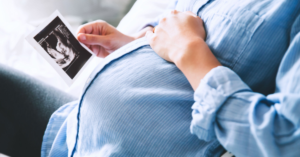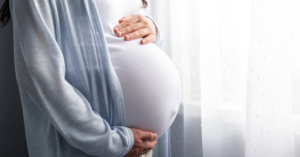Treating women in menopause with a desire for pregnancy is a unique challenge. Premature menopause can impact fertility and make it more difficult to conceive. The question that many women in this situation ask is, “Can I still get pregnant?”
As a leading boutique clinic for premium fertility treatments, we specialize in providing individualized care to women and men from all over the world. Our goal is to support each patient on their journey towards the desired child and achieve the best possible results. A particular focus is on investigating the underlying causes of fertility problems. In the course of our work, we frequently encounter women who are affected by premature menopause and are therefore concerned about their chances of getting pregnant. In this article, we would like to explain the most important facts about “premature menopause and fertility” and address myths as well as possible solutions.
What is premature menopause?
Premature ovarian insufficiency (POI), also known as premature menopause, occurs when a woman’s ovaries lose their function before the age of 40. This means that the ovaries no longer produce enough estrogen, causing hormone levels to decline. This can lead to irregular periods or even the absence of periods altogether. The absence of menstrual bleeding for a period of 12 months is defined as the onset of menopause.
Causes of premature menopause
The exact causes of premature menopause are not fully understood. However, there are certain factors that can increase the risk, including:
- Genetics: A family history of premature menopause can increase the risk.
- Autoimmune diseases: Women with certain autoimmune diseases such as thyroid or adrenal insufficiency have a higher risk of premature menopause.
- Cancer treatment: Chemotherapy or radiation therapy can lead to premature menopause.
- Chromosomal abnormalities: Certain chromosomal abnormalities such as Turner syndrome can lead to premature menopause.
Symptoms of premature menopause
Women who suffer from premature menopause may experience a range of symptoms, including:
- Irregular menstrual cycles or absence of periods
- Hot flashes
- Night sweats
- Vaginal dryness
- Mood swings
- Sleep disturbances
- Loss of libido
Desire for children in premature menopause
For women with premature menopause, it can become more difficult to get pregnant. However, there are still options to fulfill their desire to have children. Some of the common treatment options are:
- In-vitro fertilization (IVF): IVF is a technique where eggs are retrieved from a woman's body and fertilized in a laboratory. The fertilized eggs are then transferred into the woman's uterus.
- Egg donation: Women with premature ovarian insufficiency can receive eggs from a donor.
- Individualized cell treatment for the woman and, if necessary and desired, the man.
How likely is it to get pregnant during menopause?
From around the age of 45, most women enter menopause, which means that the ovaries gradually stop producing eggs and hormones. With the onset of menopause, it becomes increasingly unlikely to become pregnant as the number of remaining eggs decreases and the quality of eggs decreases. Generally, it is hardly possible to conceive naturally at around the age of 50. However, women under the age of 45 may also be affected by premature menopause, which further reduces the likelihood of pregnancy.
Can premature menopause be stopped?
Unfortunately, there is no way to stop or reverse menopause. However, for premature menopause, which is typically caused by early depletion of eggs, hormone replacement therapy (HRT) can be helpful. This can balance the declining estrogen levels and alleviate menopausal symptoms such as hot flashes and sleep disturbances. Whether HRT also increases fertility, however, is controversial.
Can women undergo artificial insemination during menopause?
Yes, it is possible to undergo artificial insemination (in vitro fertilization, IVF) during menopause. However, the likelihood of a successful pregnancy is greatly affected by age and the quality of the eggs. Therefore, it is generally recommended to undergo IVF treatment as early as possible when fertility is still present.
How can I determine if I am still fertile?
There are various methods to test one’s fertility. One option is to perform an ovulation test, which determines the timing of ovulation. Another test is the anti-Müllerian hormone (AMH), which is produced by the ovaries and provides an indication of the number and quality of remaining eggs. An ultrasound examination can also provide information about the number of follicles and the thickness of the uterine lining.
How can you tell if you are not fertile?
Infertility can manifest through various symptoms, such as missed or irregular periods, pain during intercourse, or reduced sexual desire. However, infertility is not always obvious and can also be present even with regular periods.
Which women enter menopause early?
As mentioned earlier, premature menopause can have various causes. Women whose mothers or sisters have experienced early menopause have a higher risk of being affected themselves. Autoimmune diseases or a history of cancer treatments such as chemotherapy and radiation can also lead to early menopause.
Can you be in menopause at 40? Can you be in menopause at 38?
Yes, it is quite possible to enter menopause at the age of 40 or even at 38. However, this is not the norm and depends on various factors, such as genetic predisposition or previous illnesses
Why do you get a big belly during menopause?
During menopause, there can be an increase in abdominal fat, which is due to the decreasing levels of estrogen. The hormone estrogen affects metabolism and the distribution of body fat. As estrogen levels decrease, more abdominal fat is stored.
What is better: early or late menopause?
There is no definitive answer to this question, as both early and late menopause can have advantages and disadvantages. For example, women who experience early menopause may have a lower risk of breast cancer, while women who experience late menopause may have a higher risk of osteoporosis.
How much weight do you gain during menopause?
During menopause, there may be weight gain, which on average is about 2-4 kg. However, weight gain depends on various factors, such as diet and lifestyle.
FAQs about premature menopause and fertility:
The chances of getting pregnant if you are in menopause are low. The hormone levels in the body change, which decreases the likelihood of pregnancy. However, there are some options for getting pregnant, such as through artificial insemination.
It is not possible to completely stop premature menopause, but there are treatment options available to alleviate symptoms and improve fertility. Early diagnosis and treatment are crucial in this regard.
Yes, artificial insemination is possible during menopause, but the chances of a successful pregnancy are lower than in younger women. A thorough examination and individual treatment planning are necessary in any case.
An examination by a gynecologist can provide information on whether a woman is still fertile. Various tests such as hormone tests and ultrasound can be performed to determine fertility.
Yes, it is possible to experience menopause at 40. However, it is not the norm and depends on various factors, such as genetic predisposition or previous illnesses.
There is no clear answer to whether early or late menopause is better. Every woman is individual and responds differently to the hormonal changes in the body. It is important to pay attention to one’s own health and well-being.
Weight gain during menopause is a common symptom. However, the amount of weight gain varies depending on various factors such as lifestyle, diet, and physical activity.
The last menstrual period usually occurs between the ages of 45 and 55, but this is also highly individual.
No, it is not possible to go through menopause twice. Once menopause has occurred, it means that the ovaries are no longer producing eggs.
There are various ways to determine if someone is already in menopause. One way is through a hormone test, which can measure hormone levels in the blood. Another test is an ultrasound of the ovaries, which can provide information about the size and condition of the ovaries.
In some cases, a gynecological swab can also be done to determine the hormone levels.
That varies from woman to woman. The average age range for the last menstrual period is between 45 and 55 years old. However, there are also women who experience menopause earlier or later.
No, that is not possible. Menopause marks the end of a woman’s reproductive phase and is characterized by the cessation of ovarian function. Once it occurs, a woman remains in menopause.
This varies from woman to woman and also depends on the individual symptoms. Some women may experience more severe hot flashes, while others may have trouble sleeping or experience mood swings. However, in general, the symptoms tend to improve over time.
The last menstrual period is referred to as menopause. In general, medical professionals consider a woman to have reached menopause if she has not had a menstrual period for one year. If menstrual bleeding resumes after this point, it is referred to as postmenopausal bleeding.
During menopause, a balanced diet is particularly important. Generally, one should pay attention to adequate intake of vitamins and minerals and avoid excessive sugar and fat. Alcoholic beverages should also be consumed only in moderation. Adequate intake of calcium and vitamin D is particularly important to prevent osteoporosis.

Conclusion
In summary, premature menopause can be a major problem for many women, especially if they still wish to have children. However, it is important to understand that there are still ways for many women to get pregnant even if they are menopausal. Modern medicine offers a number of treatment options, such as artificial insemination, that can help women fulfill their desire to have children.
Regardless, it is also important for women to take care of their overall health in order to maintain their fertility for as long as possible. This includes a healthy diet, regular exercise, and abstaining from bad habits like smoking and excessive alcohol consumption.
At our clinic, we specialize in helping women and couples improve their fertility and fulfill their desire to have children. With our highly specialized and individualized treatments, we have been able to help many women around the world. We pride ourselves on always going the extra mile to provide our patients with the best possible support and care.
Greetings,
Yours Mona
Founder of EpigenCode







